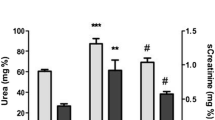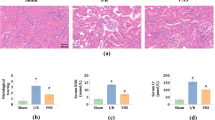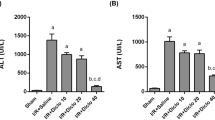Abstract
Purpose
The aim of this study was to assess the effects of naloxone, an opioid receptor antagonist, on the renal injury as a remote organ after hepatic ischemia reperfusion (IR) in rats.
Materials and methods
Forty male Wistar rats were randomly allocated into four groups as follows: sham, sham + naloxone, IR and IR + naloxone. In anesthetized rats, hepatic ischemia was applied for 30 min in IR and IR + naloxone groups. Sham + naloxone and IR + naloxone groups were given naloxone (3.0 mg/kg, iv) 30 min before ischemia. After 24 h, blood and tissue samples were obtained for histopathological, tissue malondialdehyde (MDA) and biochemical analyses.
Results
Histopathological study of liver in IR group showed enlarged sinusoids, sinusoidal congestion, cellular degenerative changes and necrosis. The kidney of the rats with hepatic IR showed pathological changes in tubular cell swelling, tubular dilatation, moderate to severe necrosis, glomerular fibrosis and hemorrhage. Histological examination confirmed the extent of hepatic and renal changes in IR group was higher (P < 0.05) than in other groups. Rats that underwent hepatic IR exhibited significant increase in serum concentrations of urea and creatinine levels (P < 0.05). The serum alanine aminotransferase and aminotransferase values were significantly higher in IR group compared to the other groups (P < 0.05). Liver IR produced a significant increase in hepatic and renal tissue MDA levels, while pretreatment with naloxone was associated with a significantly lower MDA levels (P < 0.05).
Conclusion
The results of this study showed that naloxone pretreatment protected the renal injury from hepatic IR.










Similar content being viewed by others
References
Tanaka Y, Maher JM, Chen C, Klaassen CD (2007) Hepatic ischemia reperfusion induces renal heme oxygenase-1 via NF-E2-related factor 2 in rats and mice. Mol Pharmacol 71(3):817–825
Davis CL, Gonwa TA, Wilkinson AH (2002) Pathophysiology of renal disease associated with liver disorders: implications for liver transplantation, Part I. Liver Transpl 8(2):91–109
Miranda LE, Capellini VK, Reis GS, Celotto AC, Carlotti CG Jr, Evora PR (2010) Effects of partial liver ischemia followed by global liver reperfusion on the remote tissue expression of nitric oxide synthase: lungs and kidneys. Transplant Proc 42(5):1557–1562
Weinbroum AA, Hochhauser E, Rudick V, Kluger Y, Sorkine P, Karchevsky E, Graf E, Boher P, Flaishon R, Fjodorov D, Niv D, Vidne BA (1997) Direct induction of acute lung and myocardial dysfunction by liver ischemia and reperfusion. J Trauma 43(3):627–633
Hochhauser E, Ben-Ari Z, Pappo O, Chepurko Y, Vidne BA (2005) TPEN attenuates hepatic apoptotic ischemia/reperfusion injury and remote early cardiac dysfunction. Apoptosis 10(1):53–62
Park SW, Kim M, Chen SW, D’Agati VD, Lee HT (2010) Sphinganine-1-phosphate attenuates both hepatic and renal injury induced by hepatic ischemia and reperfusion in mice. Shock 33(1):31–42
Goss JA, Seu P, Gao FQ, Wyllie S (2005) Ischemia-reperfusion of rat liver modulates hepcidin in vivo expression. Liver Transpl 11:800–806
Nordstrom G, Seeman T, Hasselgreen PO (1985) Beneficial effect of allopurinol in liver ischemia. Surgery 97:679–684
Omar R, Nomikos I, Picorelli G, Savino J, Agarwal N (1989) Prevention of postischaemic lipid peroxidation and liver cell injury by iron chelation. Gut 30:510–514
Sener G, Sehirli O, Ercan F, Sirvanci S, Gedik N, Kacmaz A (2005) Protective effect of MESNA [2-mercaptoethane sulfonate] against hepatic ischemia/reperfusion injury in rats. Surg Today 35:575–580
Shen J, Huang MK, Wu FL, Tang WH, Zao HY, Zhang H, Luo MD (1992) Effect of naloxone on the hemodynamics and the outcome of experimental acute pancreatitis in dogs. J Gastroenterol Hepatol 7:502–507
Kotzampassi K, Eleftheriadis E, Karagiannopoulou Y (1993) The effect of naloxone on the progress of acute experimental pancreatitis. Arch Hell Med 10:348–354
Toledo-Pereyra LH (1991) The mechanisms of neutrophilic oxygen damage in ischemic and reperfusion lesions. Pharmacologic manipulations. Gac Med Mex 127:349–356
Chao CC, Molitor TW, Gekker G, Murtaugh MP, Peterson PK (1991) Cocaine-mediated suppression of superoxide production by human blood peripheral mononuclear cells. J Pharmacol Exp Ther 256:255–258
Morley JE, Kay NE, Solomon GF, Plotnikoff NP (1987) Neuropeptides: conductors of the immune orchestra. Life Sci 41:527–544
Takhtfooladi MA, Jahanshahi A, Sotoudeh A, Jahanshahi G, Takhtfooladi HA, Aslani K (2013) Effect of tramadol on lung injury induced by skeletal muscle ischemia-reperfusion: an experimental study. J Bras Pneumol 39(4):434–439
Esterbauer H, Cheeseman KH (1990) Determination of aldehydic lipid peroxidation products: malonaldehyde and 4-hydroxynonenal. Methods Enzymol 186:407–421
Kesik V, Guven A, Vurucu S, Tunc T, Uysal B, Gundogdu G, Oztas E, Korkmaz A (2009) Melatonin and 1400 W ameliorate both intestinal and remote organ injury following mesenteric ishemia/reperfusion. J Surg Res 1:1–9
Chatterjee PK, Patel NS, Kvale EO, Cuzzocrea S, Brown PA, Stewart KN, Mota-Filipe H, Thiemermann C (2002) Inhibition of inducible nitric oxide synthase reduces renal ischemia/reperfusion injury. Kidney Int 61:862–871
Lemasters JJ, Thurman RG (1997) Reperfusion injury after liver preservation for transplantation. Annu Rev Pharmacol Toxicol 37:327–338
Sehirli O, Ozel Y, Dulundu E, Topaloglu U, Ercan F, Sener G (2008) Grape seed extract treatment reduces hepatic ischemia-reperfusion injury in rats. Phytother Res 22(1):43–48
Arab HA, Sasani F, Rafiee MH, Fatemi A, Javaheri A (2009) Histological and biochemical alterations in early-stage lobar ischemia-reperfusion in rat liver. World J Gastroenterol 15(16):1951–1957
Kharbanda RK, Peters M, Walton B, Kattenhorn M, Mullen M, Klein N, Vallance P, Deanfield J, MacAllister R (2001) Ischemic preconditioning prevents endothelial injury and systemic neutrophil activation during ischemia-reperfusion in humans in vivo. Circulation 103(12):1624–1630
Begenik H, Soyoral YU, Erkoc R, Emre H, Taskın A, Tasdemir M, Aslan M (2013) Serum malondialdehyde levels, myeloperoxidase and catalase activities in patients with nephrotic syndrome. Redox Rep 18(3):107–112
Kapan M, Gumus M, Onder A, Firat U, Basarali MK, Boyuk A, Aliosmanoglu I, Buyukbas S (2012) The effects of ellagic acid on the liver and remote organs’ oxidative stress and structure after hepatic ischemia reperfusion injury caused by pringle maneuver in rats. Bratisl Lek Listy 113(5):274–281
Park SW, Chen SW, Kim M, D’Agati VD, Lee HT (2009) Human activated protein C attenuates both hepatic and renal injury caused by hepatic ischemia and reperfusion injury in mice. Kidney Int 76:739–750
Oguz A, Kapan M, Onder A, Kilic E, Gumus M, Basarali MK, Firat U, Boyuk A, Buyukbas S (2013) The effects of curcumin on the liver and remote organs after hepatic ischemia reperfusion injury formed with Pringle manoeuvre in rats. Eur Rev Med Pharmacol Sci 17(4):457–466
Miranda LE, Capellini VK, Reis GS, Celotto AC, Carlotti CG Jr, Evora PR (2010) Effects of partial liver ischemia followed by global liver reperfusion on the remote tissue expression of nitric oxide synthase: lungs and kidneys. Transplant Proc 42:1557–1562
Takhtfooladi MA, Takhtfooladi HA, Moayer F, Karimi P, Asl HA (2015) Effect of Otostegia persica extraction on renal injury induced by hindlimb ischemia-reperfusion: a rat model. Int J Surg 13:124–130
Takhtfooladi HA, Takhtfooladi MA, Karimi P, Asl HA, Mobarakeh SZ (2014) Influence of tramadol on ischemia-reperfusion injury of rats’ skeletal muscle. Int J Surg 12(9):963–968
Tüfek A, Tokgöz O, Aliosmanoglu I, Alabalik U, Evliyaoglu O, Çiftçi T, Güzel A, Yıldırım ZB (2013) The protective effects of dexmedetomidine on the liver and remote organs against hepatic ischemia reperfusion injury in rats. Int J Surg 11(1):96–100
Hanci V, Erol B, Bektas S, Mungan G, Yurtlu S, Tokgoz H, Can M, Ozkoçak Turan I (2010) Effect of dexmedetomidine on testicular torsion/detorsion damage in rats. Urol Int 84(1):105–111
Jaume M, Jacquet S, Cavailles P, Macé G, Stephan L, Blanpied C, Demur C, Brousset P, Dietrich G (2004) Opioid receptor blockade reduces Fas-induced hepatitis in mice. Hepatology 40:1136–1143
Bernton EW, Long JB, Holaday JW (1985) Opioids and neuropeptides: mechanisms in circulatory shock. Fed Proc 44:290–299
Law WR, Ferguson JL (1988) Naloxone alters organ perfusion during endotoxin shock in conscious rats. Am J Physiol 255:1106–1113
Weld JM, Kamerling SG, Combie JD, Nugent TE, Woods WE, Oeltgen P, Tobin T (1984) The effects of naloxone on endotoxic and hemorrhagic shock in horses. Res Commun Chem Pathol Pharmacol 44:222–238
Xu T, Wang T, Han JS (1992) Centrally acting endogenous hypotensive substances in rats subjected to endotoxic shock. Life Sci 51:1817–1821
Valtchanova-Matchouganska A, Ojewole JA (2002) Involvement of opioid delta [delta]—and kappa [kappa]-receptors in ischemic preconditioning in a rat model of myocardial infarction. Methods Find Exp Clin Pharmacol 24:139–144
Sigg DC, Coles JA Jr, Oeltgen PR, Iaizzo PA (2002) Role of delta opioid receptor agonists on infarct size reduction in swine. Am J Physiol Heart Circ Physiol 282:1953–1960
Grimm MC, Ben-Baruch A, Taub DD, Howard OM, Resau JH, Wang JM, Ali H, Richardson R, Snyderman R, Oppenheim JJ (1998) Opiates transdeactivate chemokine receptors: delta and mu opiate receptor-mediated heterologous desensitization. J Exp Med 188:317–325
Di Francesco P, Tavazzi B, Gaziano R, Lazzarino G, Casalinuovo IA, Di Pierro D, Garaci E (1998) Differential effects of acute morphine administrations on polymorphonuclear cell metabolism in various mouse strains. Life Sci 63:2167–2174
Dinarello CA (1997) Pro-inflammatory and anti-inflammatory cytokines as mediators in the pathogenesis of septic shock. Chest 112:321–329
Stefano GB, Hartman A, Bilfinger TV, Magazine HI, Liu Y, Casares F, Goligorsky MS (1995) Presence of mu3 opiate receptors in endothelial cells. Coupling to nitric oxide production and vasodilation. J Biol Chem 270:30290–30293
Dobrenis K, Makman MH, Stefano GB (1995) Occurrence of the opiate alkaloid-selective mu3 receptor in mammalian microglia, astrocytes, and Kupffer cells. Brain Res 686:239–248
Kotzampassi K, Paramythiotis D, Kolettas A, Lazaraki G, Eleftheriadis E (2005) Naloxone: a potent protective agent in ischemia-reperfusion-induced liver injury. Ann Gastroenterol 18(4):420–426
Mutoh J, Ohsawa M, Hisa H (2013) Effect of naloxone on ischemic acute kidney injury in the mouse. Neuropharmacology 71:10–18
Author information
Authors and Affiliations
Corresponding author
Ethics declarations
Conflict of interest
M.A. Takhtfooladi, M. Shahzamani, A. Asghari and A. Fakouri declare that they have no conflict of interest.
Ethical approval
All applicable international, national and/or institutional guidelines for the care and use of animals were followed.
Rights and permissions
About this article
Cite this article
Takhtfooladi, M.A., Shahzamani, M., Asghari, A. et al. Naloxone pretreatment prevents kidney injury after liver ischemia reperfusion injury. Int Urol Nephrol 48, 1113–1120 (2016). https://doi.org/10.1007/s11255-016-1280-5
Received:
Accepted:
Published:
Issue Date:
DOI: https://doi.org/10.1007/s11255-016-1280-5




